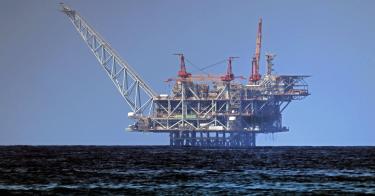An Alternative History of Peace in the Middle East
In the summer of 2020, the usually discrete spheres of energy markets and geopolitics collided when Chevron Corporation announced it was buying Noble Energy for five billion dollars—a deal that meant every bit as much to establishing a sustainable peace in the Middle East as the Abraham Accords signed some six weeks later on the lawn of the White House by Israel, Bahrain, the UAE and the United States. The Chevron-Noble deal in fact inaugurated a new era for the region in which security and economic issues took precedence over the historic grievances that had divided Jews and Arabs for so long, and opened an unprecedented opportunity for the United States to exert beneficial influence in the Middle East. Unfortunately, the Trump administration had only a few months left in office to take advantage of it, and the equivocal attitude of the succeeding Biden administration towards both energy issues and America’s role in the region may jeopardize this opportunity.
Given the scale of Chevron’s global operations, the Noble deal might seem insignificant. It was, in fact, seismic. Chevron has long been an American titan in the energy-rich Middle East, first discovering oil in Bahrain in 1932. The company now operates in the Partitioned Zone (PZ) between Kuwait and Saudi Arabia in partnership with both countries, with whom Chevron enjoys enormously lucrative relationships.
Noble on the other hand is a relatively new and small operator, whose primary regional focus has been on developing natural gas resources in the eastern Mediterranean. Important partners include Egypt, whose Leviathan gas field has been of interest to Chevron for some time. But Noble also does significant work with Israel’s Delek Drilling LP. Conventional wisdom has held for decades that if a company’s true bread-and-butter business is in the Arab countries of the Persian Gulf, that company would be prudent to avoid exposure to Israel in the event of a new conflict and potential boycott, which would have prohibited Chevron’s purchase of Noble.
>>> Abraham Accords Pave Way for Previously Unthinkable Arab-Israeli Defense Cooperation
While all of this was very true in the 1970s, the world had become a different place by 2020 because of a challenge to another piece of conventional wisdom. This held that any additional peace deals between the Arabs and Israel after the 1979 treaty with Egypt and 1994 treaty with Jordan could only come after a resolution to the Israel-Palestinian conflict.
President Donald J. Trump’s administration came into office laboring under this assumption, and went down the well-travelled rabbit hole of attempting to cobble together a deal between the government of Israel and the Palestinian Authority. The PA rejected the deal out of hand because even as President Trump opened the door to negotiations, he also directed the Department of State to follow its own rules and cut off funding for entities that explicitly criticized the United States as PA President Mahmud Abbas did in his 2017 United Nations General Assembly speech (as well as on a number of other occasions.
This demonstration that the U.S. expected the Palestinians to follow the rules even if it ruined the chances for a “deal of the century” was a radical departure from decades of bi-partisan lip service to the Palestinian cause being somehow equivalent to the U.S. alliance with Israel. In addition, President Trump finally took the step of moving the U.S. Embassy in Israel from Tel Aviv, and the long predicted catastrophic attack from the Arab world did not come to pass. These developments reflected the new reality that while Israel had established itself as a regional powerhouse in both technology and security, the PA had kept the Palestinians hopelessly mired in the past. This reality in turn opened the door to a broader Arab realization that, given staunch American support combined with its own burgeoning strength, Israel was not going away.
A material factor in the sea change of 2020 was Israel’s discovery of significant natural gas assets in the eastern Mediterranean starting in 1999, but more significantly after 2009 at roughly the same time the shale revolution was transforming America’s energy posture. For Israel, a tiny, energy vulnerable country in a hostile, energy-rich region, the issue had always been fraught with significant national security ramifications. The solution for decades was reliance on coal-generated electricity sourced from countries such as Russia, Colombia, and Australia. But Israel is now able to supply its own needs in terms of natural gas, which has had the secondary benefit of significantly lowering its carbon emissions. In February, 2023, partly due to the maritime boundary agreement brokered by the Biden administration between Israel and Lebanon, Israel launched its historic first export of crude oil to join the natural gas already flowing to Egypt and Jordan in a veritable energy declaration of independence.
Israel’s—and America’s—emergence as energy producing nations changed their respective relationships with the Arab Gulf nations. They no longer engaged as supplicants, but rather as potential partners and competitors. For Israel, this new status enhanced the growing perception of the Jewish state’s permanence, and even to the idea that not only was Israel not going away, the Arabs no longer wanted it to go away given its technological superiority and desirability as a partner against an increasingly belligerent Iran, as well as its new-found importance to energy markets.
Thus when, with U.S. leadership, the UAE and Bahrain made the strategic decision to normalize diplomatic ties with Israel independent of a deal with the Palestinians in 2020, it was literally fueled by energy. In effect, the Arabs rejected the shadow veto the Palestinians had put for so long on any such agreement. Ideally for the Palestinians this would lead to a reality check of their own resulting in a commitment to find a durable peace with Israel benefitting both sides. To date this has not materialized, and the intractable problem continues to simmer and threaten regional stability.
>>> Abraham Accords: Sowing Seeds of Peace, Harvesting Fruits of Prosperity
The arrival of President Joe Biden and his administration in January, 2021 might also have spelled trouble for the progress represented by the Abraham Accords given their inclination to favor the Palestinians, their stated antipathy towards the Gulf monarchies, and their zeal to force a transition away from fossil fuels which would negate the need for these historic relationships in the first place. Reality, however, once again intruded as the imperative to not only maintain the Gulf relationships as well as oil and gas use has become glaringly apparent if America is to remain energy secure—while ongoing PA intransigence has exhausted the region.
So even if the current U.S. administration is not overtly pursuing additional Abraham Accords style deals, they do not appear to be actively opposing them and the existing relationships are taking root. For example, Chevron’s new Israel page on its website represents this progress as there is no effort to mask the connection through a Noble subsidiary. Noble has been renamed Chevron Mediterranean Limited, and the page features a large photograph of a natural gas barge proudly flying an Israeli flag. In the past, absent iron-clad assurances from the Gulf, including Saudi Arabia, that this activity would in no way threaten Chevron’s larger business in the region, this would not have been possible. This suggests that there could be appetite for expanding the Accords in the future under more forward-leaning U.S. leadership.
The collision of energy and geopolitics that supported the Abraham Accords in 2020 signals a new era in the Middle East with all the customary opportunities and challenges for the United States. While flashpoints and frictions from the Palestinian issue to Iranian expansionism abound, the new rapprochement between our greatest ally in the region, Israel, and our historic partners in the Gulf, provides an opening for a more peaceful and prosperous future that would benefit American interests. Recognizing the critical role energy has played in this development can give us a new tool to promote stability and economic ties between our friends in the region, if we have the will to use it.
This piece originally appeared in The Caravan




